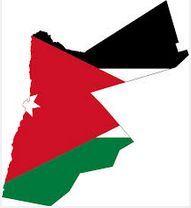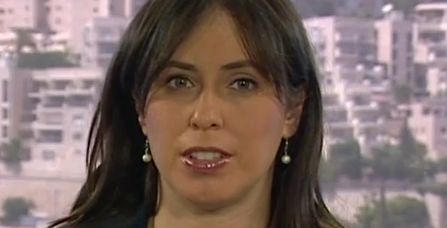Today’s Top Stories
1. Orange CEO Stephane Richard walked back his comments about leaving Israel, but his Israeli affiliate, Partner Communications Ltd, called it a “smoke cloud” to win back public support. AFP sums up why Israelis aren’t buying Richard’s regrets
Although the Orange boss said earlier this week the move was not political, his remarks in Cairo came after the publication on May 6 of a report accusing the telecoms giant of indirectly supporting Jewish settlement activity in the occupied West Bank through its relationship with Partner.
Partner CEO Haim Saban called Richard a liar and is joining Israeli tycoon Sheldon Adelson’s fight against BDS. Meanwhile, the French government said it opposes boycotting Israel.
Best commentary on the ruckus? That would be Eugene Kontorovich, who weighed in on business with occupied territories, Orange telecom, and the French approach to international law.
See HonestReporting’s take: Cleaning Up a Big Orange Mess. And see below for more background and commentary.
2. Israel and the Saudis disclosed they’ve held secret talks since 2014 on countering Iran. Weekend papers picked up on Eli Lake’s scoop for Bloomberg News. The key Saudi figure, government adviser Anwar Eshki, gave an interview to an Israeli TV station. Meanwhile, a survey found that Saudis consider Iran their main adversary, not Israel. AP coverage.
3. Israel retaliated with airstrikes on Gaza after Salafists fired another rocket at Israel. The IDF deployed two Iron Dome batteries — one near Ashdod, the other near Netivot. The Palestinian rocket landed in an open area near Ashkelon, causing no casualties or damage. Blame the Salafis, but hold Hamas responsible?
4. Say No to Anti-Semitism at the BBC: Today is the last day to join HonestReporting’s formal appeal to the BBC Trust demanding action against anti-Semitic comments by reporter Tim Willcox. While covering the Paris anti-terror rally in January, Willcox said the Paris terror attacks should be understood because “Jewish hands” were responsible for Palestinian suffering. Tell the BBC this is unacceptable and sign the petition.
The Broadening BDS Battle
• The Times of Israel examines the potential impact of Europe’s unfolding plans to label products from Israeli settlements. And Haaretz updates Israel’s latest diplomatic efforts against the directive.
• An agreement to bring thousands of Chinese laborers to Israel is being held up by Beijing’s insistence on a promise from Jerusalem that the workers won’t be employed in West Bank settlements. However, Haaretz adds that Israel isn’t giving in to China’s demand.
• A BDS campaign in Egypt contributed to Orange cutting ties with Israel. According to YNet, the campaign targeted Orange’s Egyptian affiliate, Mobinil,
A campaign titled “Boycott Mobinil” was established on Egyptian social networks, blaming the company for having worked with Israel, and even supporting IDF units who served during operation Protective Edge.
In a letter that was sent by the campaign to Orange and Mobinil, the companies where asked to cancel the “embarrassing” contract that was signed, extending the cooperation with Israel’s Partner until 2015.

• South Carolina legislature passes anti-BDS bill.
• Citing freedom of information, a pro-BDS deputy dean at Brazil’s Federal University of Santa Maria is seeking a list of Israelis on campus. Activists have filed complaints, but as Harry’s Place points out, BDS, in theory at least, only boycotts Israel, not individuals.
But in a statement to media, the university’s dean, Paulo Afonso Burmann, insisted that the flyer, which he said was issued at the request last year of five groups, was “in compliance with the law on freedom of information.”
• Nobel winners to flock to Israel, for August confab, ignoring campus boycott push.
• Other news services taking a closer look at the anti-Israel Boycott, Divestment and Sanctions movement (BDS) include the New York Times, AP, and Sky News.
Israel and the Palestinians
 • As Palestinian-Jordanian ties deteriorate, Amman is reportedly threatening to revoke the citizenship of senior PA officials. According to the Jerusalem Post, the issue isn’t only Palestinian soccer chief Jibril Rajoub’s reported failure to support Jordanian candidate Prince Ali Hussein’s bid for FIFA’s presidency:
• As Palestinian-Jordanian ties deteriorate, Amman is reportedly threatening to revoke the citizenship of senior PA officials. According to the Jerusalem Post, the issue isn’t only Palestinian soccer chief Jibril Rajoub’s reported failure to support Jordanian candidate Prince Ali Hussein’s bid for FIFA’s presidency:
The Jordanians are also said to be angry with the PA leadership for conducting “secret talks” with Israel to reach another peace agreement, the newspaper said. Some Jordanian officials were recently quoted as claiming that the PA and Israel were holding secret talks to reach an “Oslo 2” agreement without coordinating the move with the kingdom. The PA has strongly denied the claims, saying there are no secret or public talks with Israel.
• Must read: If you really want to know what steps the IDF took to protect Palestinian civilians during Operation Protective Edge, you need to learn about the army’s international law department. One key question raised by the Weekly Standard: Are IDF precautions — such as leaflets and phone calls warning civilians away, the “knock on the roof,” and the lawyers signing off on targets — going beyond international law? Is Israel unwittingly setting an unreasonable precedent for democracies fighting asymmetric warfare?
• Gazans are starting to take the risk of renewing tunnel digging into Egypt, reports NPR (audio or transcript).
• Reuters: An Egyptian court cancelled a lower court’s designation of Hamas as a terror organization. Chalk it up as another example of Calvinball in Cairo.
• With Indian Prime Minister due to make a yet-to-be-scheduled visit to Israel, the Hindustan Times takes a look at India’s Jewish community and what the development means to them.
Mideast Matters
• Druze Knesset member Ayoob Kara told reporters that the Israel is protecting the Syrian Druze without specifying the nature of the protective steps.
• Cypriot police arrested a second man in connection to a Hezbollah bomb plot.
• Ahead of Sunday’s elections in Turkey, President Tayyip Recep Erdogan lashed out at the foreign media. He’s playing the Jewish media card. AFP explains that Erdogan singled out two of my favorite papers for daring to criticize his growing autocracy. I added the links to my fellow Zionist media conspirators:
Turkish President Recep Tayyip Erdogan on Saturday stepped up his attacks on foreign media a day ahead of legislative elections, telling the Guardian to “know your limits” and lamenting that “Jewish capital” was behind the New York Times.
• Young Turkish Jews trickling away from shrinking community.
Commentary/Analysis
• Lots of commentary about Orange’s blue and white mess, and about BDS in general.

• Worth reading: Jordanian-Palestinian journalist Mudar Zahran lays out why the BDS movement is bad for the Palestinians:
The unfairness and obvious bias that characterize the BDS movement are not only bad for Israel, but are in fact detrimental to us all. Driving Israeli businesses out of areas with a high Palestinian population results in young men being unemployed, and we all know a hungry man is an angry man. Those men could easily be radicalized even more than they already are, which is very dangerous today, as Islamists try to engulf the entire Middle East in flames.
• Time‘s Karl Vick made my antennae twitch. He ties the BDS movement back to liberal Zionists who opposed settlements well before the Palestinians adopted the boycott tactic.
The irony is that the liberal Zionists only sought to boycott settlements, not all Israeli products. Israelis who support targeted settlement boycotts with the aim of pressuring the Israeli government to advance a two-state solution are the ones with the most to lose to today’s BDS.
• More commentary on L’affaire Orange and BDS:
– Anshel Pfeffer: For Israel, Orange is the new blacklist
– Ben-Dror Yemini: Evil spirit of BDS not only threatens Israel
– Jonathan Tobin: French move illustrates BDS peril
– Dan Margalit: A war on BDS
– Prof. Ze’ev Zahor: The silent exclusion of Israeli academics
– Cnaan Lipshiz: Orange pullout seen as sign of BDS influence on French policy
– Haviv Rettig Gur: When it comes to tackling BDS, Israel is all talk, no action
– Gad Perez: Partner can come out ahead

• Jeff Jacoby gives a thumbs up to Tzipi Hotovely’s call to Israeli diplomats to assert Jewish rights to the land, not just security. Touching on an important Israeli debate, the Boston Globe columnist writes:
Israel has gained nothing from its unwillingness to assert vigorously the Jewish claim to the land as a matter of historical justice and biblical legitimacy. It has only made it easier for its enemies to promote a false narrative of Zionist aggression and illegal occupation. Hotovely may have “raised eyebrows” in exhorting Israel’s diplomats to focus unapologetically on Jewish rights and history, but the record is clear: Those are the arguments that have always gained the most traction.
To repeat: Diplomacy isn’t Bible class. But the strongest case for Israel is rooted in more than security. Even now, according to the Pew Research Center, 44 percent of American adults — and 55 percent of American Christians — believe Jews have a God-given right to the land of Israel. A backward superstition? On the contrary. The Jewish nation’s ties to its homeland are an enduring element of the human story, and an asset that Israel underrates at its peril.
• Hamas and Fatah are blocking Palestinian elections. Khaled Abu Toameh explains why.
• If Not for Israel, Islamic State Would Control Saddam Hussein’s Nuclear Reactor
• Here’s what else I’m reading this weekend . . .
– Elliott Abrams: The Saudis and Israel
– Lawrence Franklin: Why Iran will walk away from Obama’s nuclear deal
– Baltimore Sun (staff-ed): Iran’s dangerous game
– David Harris: Why history matters: The 1967 Six-Day War
– R.W. Johnson: A grim prospect for South Africa’s Jews
– Wall St. Journal (staff-ed): Sanctions relief for Hezbollah (click via Google News)
Featured image: CC BY-NC flickr/Sander Spolspoel with additions by HonestReporting; Hotovely via YouTube/BBC News;
For more, see yesterday’s Israel Daily News Stream and join the IDNS on Facebook.



